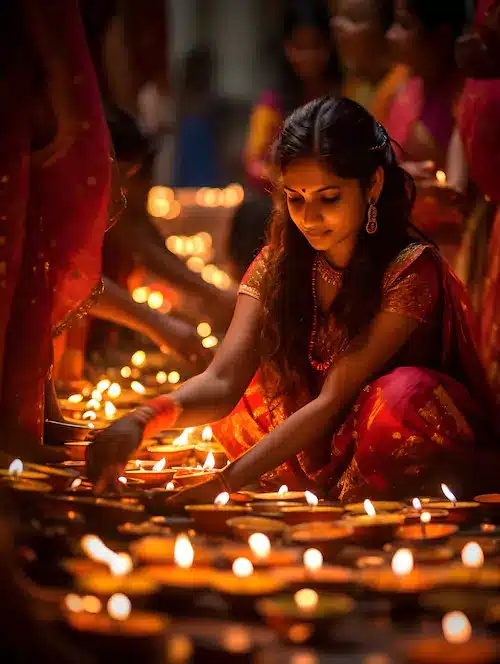Seasonality in event planning affects the event planning business a lot.
To book your profits and prepare for potential losses, plan your calendar accordingly.
This article will tell you the peak periods for weddings, festivals, and more.
Other than that, we also want to share some tips for the off-season.
Let’s get into what’s in store for you.
A. When are event planners in demand the most?
Event planners find themselves to be the busiest in December and January globally. With the holiday season in the Western world and pleasant winter in the East, events are prevalent.
From Christmas, moving into January, and lots of holidays here and there. December and January present event planners with lots of opportunities.
From large-scale public events to cozy private events, event planners find their hands full.
B. Seasonality in event planning for schools and colleges
If you manage events in schools and colleges, here are the months when you’ll be busiest.
Most of the college fests take place around December and February before and after the winter vacation.
For other events like graduation parties, orientations, and freshers’ parties, the season is March-May.

During the summer vacation in June and July, most of the students are traveling back home. Thus, the seasonality in event planning here takes a hit.
C. When is the wedding season in India?
The peak season for weddings in India is from October to May. Around 80% of all weddings occur during this period [source: Shaadi.com].
Wedding season in India is largely determined by the Hindu lunar calendar known as Panchang.
This is such a huge factor behind seasonality in event planning as 80% of the Indian population is Hindu.
Other than this, many people from other faiths also get married within these months.
If you’re wondering why, the answer is simple.
The favorable weather conditions in these months allow for weddings to turn smoothly.
However, for all the wedding planners out there. You can prepare for the off-season as well.
Engage your clients in pre-wedding ceremonies like engagements, Haldi, Mehandi, and other parties.
Since venues are cheaper during the off-season, you can provide your clients with affordable packages.
D. Seasonality in event planning for Indian festivals
The spending capacity of Indians increases considerably during the festive season [source: Business Standard].
So it’s only natural you’ll see many events taking place around that time as well.

If you’re an event planner looking to capitalize on the festive season, keep an eye on these:
- Diwali: It typically falls in October/November
- Dussehra: It usually occurs in September/October
- Holi: Typically celebrated in February/March
- Christmas & New Year’s Eve: While it is celebrated by Christians, it is increasingly gaining popularity. The last week of December is almost always packed for event planners
- Valentine’s Day: 14th February is your new best friend. Plan romantic events for couples, game nights, or singles’ mixers. For more ideas, read: Valentine’s Day Event Ideas
- Halloween: It’s celebrated in October and is increasingly getting more popular. Host costume parties with spooky decorations. Some examples include trick-or-treating events for families or themed murder mystery events
Note: Dates for many important festivals, especially religious holidays have different dates each year.
Make sure to check the calendar in advance to gear up for the year ahead.
E. Regional seasonality in event planning
Yes, the seasonality in event planning isn’t just about seasons in India.
Being a diverse country, you’ll see slight variations in different states.
For example, the wedding season in South Indian states is slightly longer. Due to milder weather conditions, you could be focusing on these states to plan events like weddings.
In the previous section, we covered major festivals celebrated in India.
While they do create peaks in the seasonality in event planning, we must also acknowledge regional peaks.
It only means you have more opportunities other than the major festivals discussed above.
Think about Onam in Kerala and Ganesh Chaturthi in Maharashtra.
You could be getting contracts for setting up reunions or pandals in such cases.
Don’t forget to look into the festivals happening in other states when you aren’t getting enough clients in the off-season.
The season is probably on somewhere else and you didn’t even look!
F. Which events are not affected by seasonality in event planning?
Lucky for you, if you modify your range of skills slightly, you can still have a business. Yes, event planning contracts even in the off-season!
Two sectors of event planning are profitable all year round.
One of them is corporate events. Not only are there many types of corporate events, it’s also the fact that corporates are busy all year.

While there’s no such off-season for corporate events, there are certain peak points you can expect:
- Through January and March, corporate activities and events are at their peak. It’s often a fresh start after a long holiday season. Expect a lot of conferences, orientations, product launches, and annual meetings. Prepare your packages in advance to deal with this effect of seasonality in event planning
- Certain peak seasons are also in sync with all the festivals around the year. A lot of celebratory events and CSR activities occur in offices right before the main festival. Since the actual festival itself is a leave for the company
Another evergreen sector of event planning has to be personal events. From birthdays to anniversaries, they happen all year round.
At this point, you don’t need to curate your event planning packages as per the seasonality of the month.
Rather, you can simply curate special packages for all of these personal events.
To know where to start, learn all the possible personal events your services may be required for.
G. When is the off-season in the event industry in India?
While it is completely possible for event planners to have clients all year round, here are some reality checks.
You may struggle more than usual in the extreme monsoon and summer months.
It’s simply because the weather poses limitations on travel and venue options.
To elucidate, you will have to rule out many outdoor venues around this time.
You can definitely opt for indoor venues but there are very few that are suitable for large-scale events.
Due to the risk of calamities and getting stuck in traffic, the usual turnout in these months is quite low.
As an event planner, you too might want to avoid these months by yourself too. This is because logistical challenges and extra costs to deal with sudden weather changes can be quite costly.
Note: Peak monsoons (June-Sept) and peak summer (April-May) are usually considered the off-season in the event industry.
However, don’t confuse it with loss of business in terms of revenue. You can organize events in amazing indoor venues and pool spaces during monsoon and summer respectively.
By dealing with the problems posed by the weather, you can also attract premium prices from attendees. They too would like respite from extreme weather.
H. How to keep your event planning business profitable in the off-season?
As an event planner, the fear of being out of business is huge. If not all the time, there are definitely a few months where you feel like you aren’t getting enough gigs.
For those slow times in your career, there are still hacks you can try to boost your business:
- Focus on seasonal promotions and discount packages. This way, you can attract clients in the off-season with the pricing strategy. This hack is great for events like birthday parties and intimate gatherings that happen all year round
- Expand your services for the off-season. For example, your niche may be wedding planning but you can offer other kinds of events in the off-season. Consider learning how to plan themed events, experiential events, etc.
- Don’t forget to use the major discounts and bargaining power during the off-season. You’ll incur less costs around this time. Look at the bright side!
- You may hate the seasonality in event planning. However, a lot of your clientele also waits for this period to have events on a budget. Do targeted marketing to this audience
- Another great way to use this is to network extensively. Focus on upskilling, meet industry leaders, and build bonds with potential clients
I. The most important skill to face seasonality in event planning
If advice is what you came for, we have one thing to say about seasonality in event planning.
You need to be adaptable.
Understanding the seasonal demands of your region is the first step.
Then adapt to the new client preferences so you can deliver great events all year round.
With this art of adaptability, consider combining good marketing skills and the desire to learn.
J. FAQ
1. How does the Hindu calendar influence wedding seasonality?
Panchang is the Hindu lunar calendar. It dictates auspicious dates for weddings. This is different for each year and has an effect on the peak season for weddings in India.
2. When is the peak season for event planners in India?
The peak season for event planners varies from event to event. Weddings are most frequent from October to May. Festivals in India are abundant each year round but come. Read the full article for region-wise festivals in India. There is no peak season for corporate events as such but might happen significantly from January to March.
K. Word from EventTube
We hope you enjoyed reading our analysis of the seasonality of event planning in India.
To help you with the latest tricks and guides as per each season, sign up for our newsletter below.
With each new event planning season, we’ll keep you prepared in advance.
See you another time!






